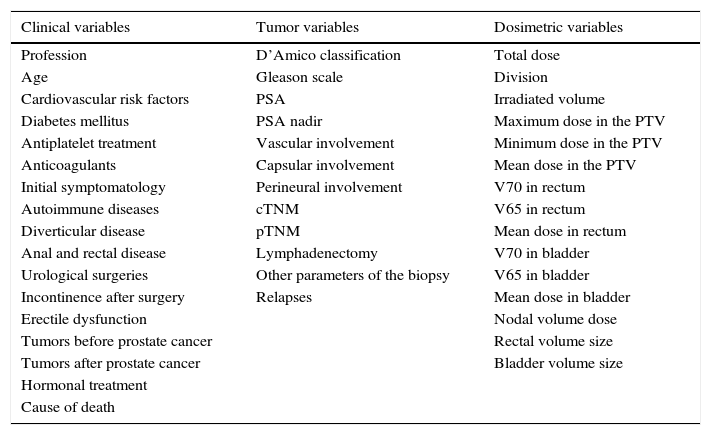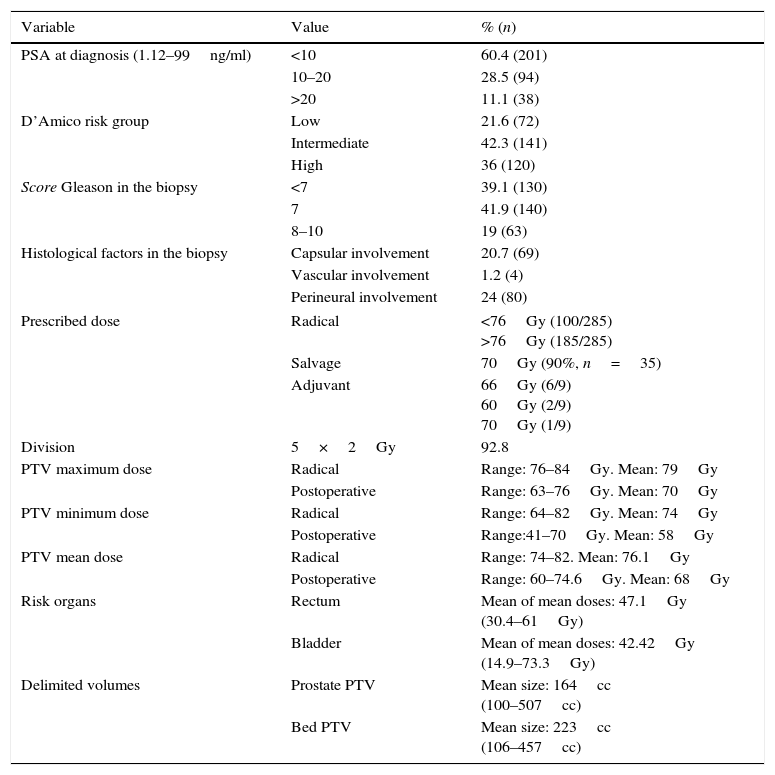To determine rectal and urinary toxicity after external beam radiation therapy (EBRT), assessing the results of patients who undergo radical or postoperative therapy for prostate cancer (pancreatic cancer) and their correlation with potential risk factors.
MethodA total of 333 patients were treated with EBRT. Of these, 285 underwent radical therapy and 48 underwent postoperative therapy (39 cases of rescue and 9 of adjuvant therapy). We collected clinical, tumor and dosimetric variable to correlate with toxicity parameters. We developed decision trees based on the degree of statistical significance.
ResultsThe rate of severe acute toxicity, both urinary and rectal, was 5.4% and 1.5%, respectively. The rate of chronic toxicity was 4.5% and 2.7%, respectively. Twenty-seven patients presented haematuria, and 9 presented hemorrhagic rectitis. Twenty-five patients (7.5%) presented permanent limiting sequela. The patients with lower urinary tract symptoms prior to the radiation therapy presented poorer tolerance, with greater acute bladder toxicity (p=0.041). In terms of acute rectal toxicity, 63% of the patients with mean rectal doses >45Gy and anticoagulant/antiplatelet therapy developed mild toxicity compared with 37% of the patients with mean rectal doses <45Gy and without anticoagulant therapy. We were unable to establish predictors of chronic toxicity in the multivariate analysis. The long-term sequelae were greater in the patients who underwent urological operations prior to the radiation therapy and who were undergoing anticoagulant therapy.
ConclusionsThe tolerance to EBRT was good, and severe toxicity was uncommon. Baseline urinary symptoms constitute the predictor that most influenced the acute urinary toxicity. Rectal toxicity is related to the mean rectal dose and with anticoagulant/antiplatelet therapy. There were no significant differences in severe toxicity between radical versus postoperative radiation therapy.
Determinar la toxicidad rectal y urinaria tras radioterapia externa (EBRT), valorando resultados de pacientes sometidos a tratamiento radical o postoperatorio por cáncer de próstata y su correlación con potenciales factores de riesgo.
MétodoTrescientos treinta y tres pacientes tratados con EBRT, 285 radicales y 48 tras cirugía (39 rescate; 9 adyuvante). Se recopilaron variables clínicas, tumorales y dosimétricas a correlacionar con parámetros de toxicidad. Se elaboraron árboles de decisión según el grado de significación estadística.
ResultadosLa toxicidad aguda severa, tanto urinaria como rectal, fue del 5,4% y del 1,5%, respectivamente. La toxicidad crónica fue del 4,5% y del 2,7%. Veintisiete pacientes presentaron hematuria y 9 rectitis hemorrágica. Veinticinco (7,5%) presentaron secuelas permanentes limitantes. Los pacientes con síntomas del tracto urinario inferior previos a la RT presentaron peor tolerancia, con mayor toxicidad vesical aguda (p=0,041). Respecto a la toxicidad rectal aguda, pacientes con dosis media en recto>45Gy, con tratamiento anticoagulante/antiagregante, desarrollaban un 63% de toxicidad leve frente al 37% de los pacientes con dosis media rectal<45Gy y sin anticoagulantes. No se han podido establecer factores predictivos de toxicidad crónica en el análisis multivariable. Las secuelas a largo plazo son más elevadas en los pacientes con cirugías urológicas previas a la RT que siguen tratamiento anticoagulante.
ConclusionesLa tolerancia a EBRT es buena y la toxicidad severa poco frecuente. La sintomatología urinaria basal es el factor predictor que más influye en la toxicidad urinaria aguda. La toxicidad rectal se relaciona con la dosis media al recto y con el tratamiento anticoagulante/antiagregante. No existen diferencias significativas en la toxicidad grave entre RT radical y a RT postoperatoria.











